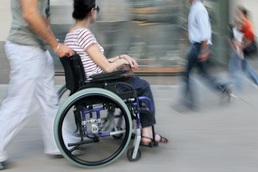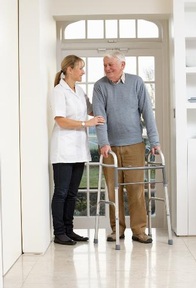Government struggling to win confidence on Personal Independence Payments
Uncertainty surrounds the Government’s decision to amend its eligibility criteria for disabled benefits, with disagreement among onlookers as to whether new legislation will have positive or negative effects upon the lives of adults with a disability.
New policy will see the Disability Living Allowance replaced with a Personal Independence Payment (PIP) assessment, designed to achieve a more individualised benefits system by taking a clearer view of the activities an individual is able to carry out.

Minister for Disabled People, Esther McVey, claimed the support of the disabled community when announcing the amendments, saying: “I know that disabled people and their representatives feel strongly that this important concept is set out in law and I am happy to do this.
“Our intention has always been the same – we want to target support at those who need it most. We have always said that we will not just look at whether individuals can carry out activities but also the manner in which they do so.”
Similarly Iain Duncan Smith, the Work and Pensions Secretary, has heralded the reforms as the biggest for six decades and claimed that people will be lifted out of poverty as a result and that lower and middle income families will be better off as a result. The response from charities and campaigners has been far more divisive, however, with many organisations, including from the care sector, highly critical and suspicious of what they consider to be a cost-saving exercise from central government.
Jane Young of campaign group We Are Spartacus feels so strongly that disabled adults will suffer as a result of the reforms that she has compiled her own report, ‘Emergency Stop’, as part of an attempt at legal action against the Government.
Ms Young warns that adults unable to walk more than 50 metres might lose their mobility vehicles and see their personal independence eroded. As her report states: ‘Once PIP has been fully implemented, in 2018, up to 428,000 fewer people will qualify for the enhanced mobility element which provides eligibility to lease cars using the Motability scheme. This will have profound social and economic effects.
‘Our report outlines how the eligibility criteria for PIP’s enhanced mobility element will mean many hard working disabled people will no longer be able to work and almost all those affected will struggle to attend medical appointments, go shopping, parent their children, support their families and take part in daily life.’

Another report by Dr Simon Duffy, compiled for the Campaign for a Fair Society, entitled ‘A fair society? How the cuts target disabled people’, attacks the reforms for making ‘no effort to understand the cumulative impact of its cuts on minority groups’. The report also links benefits cuts with cuts to social care funding, as well as cuts to housing and regressive tax increases as combining to have a cumulative impact on the lives of vulnerable adults.
Dr Duffy also blames “a failure in the political process to respect human rights and the need for a universal welfare system”.
Choice Support’s chief executive Steven Rose concurs with these conclusions, responding to the report with, “I was particularly struck by the report’s assertion that combined cuts in benefits and services mean that people with severe disabilities will lose an average of £8,832 per person each year. That’s £24 a day. It confirms what we see in our day-to-day work, that many disabled people are facing a future of plummeting standards of living, when in most cases they were already poor in the first place. Claims that the cuts are fair simply don’t add up.
“I welcome the report. Everyone genuinely concerned with the grossly unfair treatment being meted out to sick, poor and disabled people should treat it as a rallying call. I think it’s time for those of us who support disabled people to speak out against what is a palpable injustice. If cuts are necessary, as we’re told they are, is it really right and fair that they should be targeted at our society’s most vulnerable members? I invite all my colleagues in social care to join me in urging the government to reconsider the impact of its actions.”

In contrast, however charity Royal Mencap Society has announced its delight at the progress made towards the new PIP system. Senior policy officer Jane Alltimes comments:
“This is very welcome. The assessment for PIP shouldn’t only consider whether someone is able to carry out an activity, but also the way in which it is carried out. For example, can someone get dressed or move around without causing themselves harm or within a reasonable time period?
“Having this defined in law should help to make sure these rules are applied consistently by assessors and help disabled people know their rights.”
Leonard Cheshire Disability is looking for a wider view of the issue, believing that the rights of disabled adults should be recognised as a ‘global development priority’.
In this respect the charity was pleased to see the Prime Minister attending last month’s meeting of world leaders in Liberia. Interim director of international Julian Gore-Booth comments: “Given that the new goals will guide future development, it is essential disability is given greater priority. Millions of disabled people across the world are excluded from education and work and are at risk of extreme poverty.
“We have already been encouraged by the advance meetings held this week in Monrovia where leading delegates are supporting our call. But if disability is specifically included in the new post-2015 framework, national governments will be obliged to improve access to education, employment, healthcare and support for disabled people.”
Vote on whether you think PIP will be a good system here:www.homecare.co.uk/news/article.cfm/id/24/will-the-new-personal-independence-payments-pip-support-societys-most-vulnerable
Latest News Analysis
 04-Sep-19
Extra £1.5 billion announced for social care in Chancellor's Spending Review
04-Sep-19
Extra £1.5 billion announced for social care in Chancellor's Spending Review
 17-Jul-19
Flexible Working Bill for all jobs gets MPs approval - delighting parents, disabled and carers
17-Jul-19
Flexible Working Bill for all jobs gets MPs approval - delighting parents, disabled and carers
 18-Jun-19
Overnight care workers forced to sleep in offices and told 'bring your own bedding'
18-Jun-19
Overnight care workers forced to sleep in offices and told 'bring your own bedding'
 11-Jun-19
PM candidates on social care: Rory Stewart calls fixing care an 'unfinished revolution'
11-Jun-19
PM candidates on social care: Rory Stewart calls fixing care an 'unfinished revolution'
 05-Mar-19
Amber Rudd announces scrapping of controversial PIP payment review for pensioners
05-Mar-19
Amber Rudd announces scrapping of controversial PIP payment review for pensioners